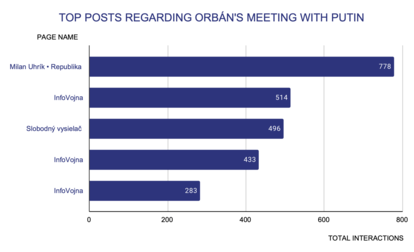DISINFORMATION
Sanctions against Russia are once again being discredited, Orbán’s meeting with Putin garners support from pro-Russian actors

- While Putin and Orbán's recent meeting in Beijing drew criticism from European leaders, disinformers have been actively propagating Orbán's actions. They praise Orbán's politics and his supposed intention to ensure “peace”.
- Slovak politicians’ stance on foreign policy, portraying it as sovereign and impartial, is being actively discussed. The new government oppose military aid to Ukraine, emphasising the need for negotiation to achieve peace, while completely ignoring the dynamic of the conflict.
- Debates regarding sanctions against Russia in Slovakia have attracted pro-Kremlin actors who claim that sanctions are non-functioning and hurt Europe more than Russia. This narrative aligns with the talking points of pro-Kremlin propaganda.
The meeting of Orbán and Putin is being praised by disinformers
Almost two weeks ago, Russian President Vladimir Putin met Hungarian Prime Minister Viktor Orbán on the sidelines of the Belt and Road Forum in Beijing. The two politicians shook hands – this was the first photographed handshake between the Russian president and an EU member state leader since Moscow's full-scale invasion of Ukraine in February 2022.
During the meeting, Putin stated that despite current geopolitical conditions, Russia has managed to maintain and strengthen ties with many European countries, including Hungary. In return, Orbán noted that Hungary has never sought to confront Russia and expressed his willingness to expand mutual communication.
This move has since been criticised by other European political leaders, with Luxembourg’s Prime Minister calling the handshake “a middle finger to all Ukrainians” or the Lithuanian President calling out Orbán for “flirting” with Russia. However, the warm ties with Putin, which the Hungarian Prime Minister continues despite the Russian aggression in Ukraine, have still managed to garner support. Slovak actors who continuously publish pro-Russian content praised Orbán for his politics and supposed intention to assure peace.
The most active when it came to propagating Orbán’s activities concerning Russia were disinformation sites notorious for spreading pro-Russian and anti-Western notions. InfoVojna (“InfoWar”) has repeatedly posted articles about the meeting. In one of them, they pointed out that “Putin expressed satisfaction with the relations between Russia and Hungary” and that the Chinese President Xi Jinping described the Hungarian Prime Minister as “an old friend”. In another article, they highlighted that Orbán is “proud” of his relationship with Putin.
Additionally, InfoVojna reported that Orbán “was interested in doing everything possible to ensure that peace prevailed”. This supposed intention to ensure peace was also praised by Milan Uhrík, an MEP and a chairman of the far-right Republika party. In a post commenting on the meeting, he said: “Viktor Orbán has his wits about him. Talking about peace is never a bad thing. Thinking about the future either. Slovakia can take inspiration from this.”
Since Russia invaded Ukraine last year, Orbán has been called out for opposing EU initiatives aimed at assisting Kyiv in its fight against Moscow. His government has closer relations with Russia than other member countries and is seen advancing some of Moscow's goals, such as preventing NATO expansion. Glorifying and praising this type of political behaviour, as well as portraying it as something that other countries should take inspiration from, is therefore very problematic. Especially since it is Russia that is still occupying significant parts of the Ukrainian territory. Orbán has long been an idol for these actors, and his positions also fit well with their continuous rhetoric.
Since posts about the meeting of Orbán and Putin were prevalent in Slovak information space in the past two weeks, we also looked at it through an optic of a list of disinformation actors in Slovakia. We used the CrowdTangle analysis tool to analyze the most popular posts on Slovak Facebook that include the keyword “Orbán”. Posts were evaluated based on the total number of interactions (the sum of all reactions, comments, and shares).

The first place belongs to the aforementioned post by Milan Uhrík, in which he suggests that the steps taken by Orbán should be an “inspiration” to the Slovak politicians.
The second place belongs to the post by InfoVojna, in which the site reports that Orbán is “proud” to have friendly ties with Putin.
The third place belongs to a post by disinformation site Slobodný vysielač (“Free broadcaster”), notorious for spreading pro-Russian disinformation. In the post, they cite the Hungarian Prime Minister saying: “We want to do everything for peace. That is why we are keeping the channels of communication open with the Russians… It is a strategy we are proud of.”
The last two places belong to posts by InfoVojna. In the first one, they point out that “Putin expresses satisfaction with Russia-Hungary relations”, and in the second one, they praise the supposed “sovereignty” of Orbán’s foreign policy, which goes against the EU's international commitments to Ukraine.
Discussions about the “sovereign” foreign policy in Slovakia
As far as emphasising a "sovereign" foreign policy goes, this topic has been discussed in Slovakia mainly in connection with the statements of the new prime minister Robert Fico (antisystem SMER-SSD party). Fico announced that while he supported “comprehensive” nonmilitary aid to Ukraine in its war against Russia, he will be supporting “zero military aid to Ukraine”.
He explained his decision to do so on his social media. Fico expressed his belief that sending military aid to Ukraine is only prolonging the “unnecessary killing” and that both sides of the conflict need to “negotiate” to achieve peace. He also declared that he had his own sovereign opinion and that the foreign policy he would pursue would be “Slovak, not Brussels, Washington or Russian” attempting to portray himself as impartial.
Milan Uhrík, who is known to be very critical of the European approach to the conflict, has also shared a similar idea. He said that “the let's follow what is agreed in the EU’ approach is no longer correct” and called for a more independent policy.
However, it is essential to state a few things. Russia is the side which started the war. Ukraine has not invaded Russia and is not fighting on Russian territory. Telling both sides to “just negotiate” means entirely omitting the dynamic between the two countries and portraying them as equal parties to the conflict. This ignores the fact that Russia is the aggressor and that the Russian ideas of peace are built on the capitulation of Ukraine.
Furthermore, the pro-Russian actors do not seldom hide their pro-Kremlin attitudes utilising so-called false objectivity, through which they try to put themselves in a neutral position in the Russian-Ukrainian conflict. They also like to disguise these attitudes with ideas about the "sovereignty" of Slovakia, which is supposed to stand against the opposition of a “dictate” by the EU or the USA. In reality, the statements are not impartial or unbiased at all.
Sanctions against Russia are once again becoming a talking point
In the past two weeks, the topic of aid and measures related to the war in Ukraine has been prominent in the Slovak information space. This was largely concerning Fico’s declarations about not supporting any additional sanctions against Russia in the future. Even though these statements were mainly reported on by disinformation sites, thus managing to increase their reach in the information space, there have been no specific narratives tied to the statements.
However, the topic still resonated and other actors found themselves reacting. The most active in this topic were the members of the far-right Republika party, mainly its chairman Milan Uhrík. In a Facebook post, in connection to the planned 12th EU’s sanctions package, he said that the “anti-Russian (and especially energy) sanctions are a total fiasco. They hurt Europe more than Russia. They need to be lifted and help people live easier and not make up nonsense”. The post has been re-shared by another party member Milan Mazurek.
The narrative that calls sanctions against Russia non-functioning and wasteful has been one of the main points of pro-Kremlin propaganda ever since their imposition. Nowadays, this can also be verified by the fact that the embassy of the Russian Federation in Slovakia has been publishing posts about the supposed wastefulness of sanctions more frequently. For example, in one of the posts, the Embassy declares that “the European Union's ‘sanctions obsession’ against the Russian Federation continues, but past experience shows that restrictions do not work”.
In fact, the evidence shows that sanctions against Russia are working. According to the European External Action Service, “Within a year, they [the sanctions] have already limited Moscow’s options considerably causing financial strain, cutting the country from key markets and significantly degrading Russia’s industrial and technological capacity”. Russian economy seems to be shrinking in the past two years, with the World Trade Organization predicting a continuation of this trend in 2023. According to the OECD, its GDP will fall by 2.5% in the worst-case scenario or by 0.2%, as the World Bank predicts.
The 12th package of sanctions is planned to target $5.3 billion in Russian trade and by spreading the false narrative of the uselessness of the sanctions, pro-Kremlin actors are attempting to diminish the public support for the measures as well as undermine the efforts of the EU to reduce Russian capabilities.
Project Infosecurity.sk organized by Adapt Institute, which is supported by the Prague office of the Friedrich Naumann Foundation for Freedom, continuously monitors the activities of both Slovak and foreign disinformation actors, but focuses mainly on the former. The project activities are built upon daily monitoring of emerging disinformation, hoaxes, and conspiracy theories in the online information space. This approach allows the analysts to identify disinformation posts and narratives that resonated with the public the most, as well as to find out where they originated, and how they spread and evolved on social media. The report takes the form of a bi-weekly summary of arising trends in the spread of malicious information content online. Based on that, Infosecurity.sk can warn the public about emerging and current trends in the field of disinformation, manipulation, and propaganda.

